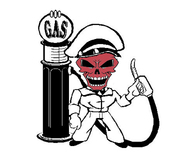Never Bring A Rapier To An Ethanol Gun Fight
 |
Ethanol critics with glass arguments shouldn't throw stones
By Marc J. Rauch
Exec. Vice President/Co-Publisher
THE AUTO CHANNEL
 Marc Rauch |
 Robert Rapier |
Then, two days later, Robert followed up with another ethanol story, "THE PROBLEM WITH THE ETHANOL INDUSTRY."
I've been in business for 50 years - half a century. I've worked closely with companies in all types of industries, and with companies of all sizes - creating business plans, marketing plans, sourcing manufacturers, developing production plans, devising advertising plans, and directing the implementation of many of the plans. So, without even reading the story I thought to myself: "Every industry has problems, why shouldn't the ethanol industry?" Funnily enough, as I read his article, I noted that Robert himself acknowledges that all industries have problems - he says so in the second paragraph.
I continued reading, and in the very next paragraph I read something that I don't agree with. Robert wrote:
-
"The business model of the ethanol industry...is to get the federal government to force consumers to use their product."
I felt that this is an unfair and myopic view of the ethanol fuel industry, for which there are real reasons and needs for the ethanol industry to exist. I read more, and found some additional points of
disagreement, such as:
-
"Refiners object to the entire concept of being forced to blend ethanol, and for being penalized if they don't. Refiners have spent billions of dollars complying with the ethanol mandates. That
cost to the refiners is essentially a transfer of wealth to the ethanol industry."
"...the ethanol industry...relied on federal subsidies, import tariffs designed to keep out Brazilian ethanol, and a federal mandate. After fighting to keep the federal subsidies for years, the ethanol industry finally lost the main federal subsidy ($0.45 per gallon) at the end of 2011."
(Responding to a statement by Sen. Grassley about ethanol engendering free-market conservatism, Robert wrote) "Forcing consumers to use your product is the opposite of the free-market conservatism Senator Grassley says he supports."
I believe that these comments from Robert are intellectually dishonest and historically inaccurate. The petroleum oil industry enjoys its position of dominance for one reason only: Federal government interference. You can't honestly fault the ethanol industry for accepting a morsel of crumbs from the same hand that nourished the oil industry for more than 150 years, right up to today. This was the subject of the thesis that Rob Bradley, Jr. requested from me and then published on his MasterResource online blog (Ethanol’s Lost Decades: Could We Have Had a Biofuel World?).
If Robert Rapier wants the ethanol industry to act mature and grown up, shouldn't the suggested role model (the oil industry) be worthy of emulation? At this point in time, shouldn't the oil industry be free from all governments supports and be standing on its own?
Refiners object to being "forced" to blend ethanol into gasoline, and being penalized if they don't, for just one reason: the loss of profit. Refiners have long had to blend various additives into gasoline, they know how to do it. They used to blend in tetraethyl lead, then they blended in ethylene bromide, then they blended in other anti-corrosion chemicals and detergents, and then MTBE; so there's no big deal to blending in ethanol. Robert says that the cost to the refiners was a transfer of wealth to the ethanol industry. Even if this was true we all have to remember that this "transfer of wealth" was due to the oil industry's theft of the public's health through the use of the poisonous fuels. For years the oil industry hid the truth about the health risks, just as the Tobacco Industry did. They lied to America and to the world.
In any event, the $.45 per gallon subsidy that Robert refers to didn't go to the farmers or the ethanol industry, it primarily went to the oil/gasoline blenders to make up for having to use 10% of someone else's product. This is the so-called transfer of wealth. So, you see, any animosity felt by refiners for just doing what they have done for many decades (blending ingredients to make this stuff called gasoline), is nonsense because they were compensated.
The effort to end the "blenders tax credit," led by oil industry champion Senator Tom Coburn, backfired on the oil industry. They had assumed that by removing the tax credit that the cost of ethanol-gasoline blends, which were lower priced than ethanol-free gasoline, would increase and make consumers angry. The angry consumers would then scream at their elected representatives to change the law, and the oil industry would be able to add some other crap derived from crude oil. The removal of the blender's tax credit wound up having no effect on the retail price of ethanol-gasoline blends, which remained lower priced than E0. So, it's not accurate to say that the ethanol industry lost the "main federal subsidy," and by implication lost millions or billions of dollars; the oil industry lost that money. They cut their nose to spite their faces, as the old saying goes.
Regarding the issue of Senator Grassley's free-market conservatism, and then Robert's response that "Forcing consumers to use your product is the opposite of the free-market conservatism," I think we need to be realistic here. Correcting an injustice is not an injustice. Requiring a race horse to carry extra weight in the jockey's saddle to compete against heavier horse/jockey units is not an unfair disadvantage, it is leveling the field. The oil industry hasn't been an open and free market since around the American Civil War. Oil companies have used their muscle to keep competitive fuel products out of service stations, even when they don't own specific stations. The RFS didn't, and doesn't force customers to use ethanol, it requires the use of any renewable fuel to extend the available supply of fuel. The oil industry had their chance to give us another oxygenate to replace tetraethyl lead, and they gave us another poison, MTBE. The oil industry could use higher concentrations of aromatics to replace ethanol, but it would cost much more and it would multiply the amount of poisons thrown into the air. So the choice...THE CHOICE...is ethanol.
 Dead American servicemen, the victims of the modern Black Death: petroleum oil. |
But what the heck, let's say that only half of the 120 million died in oil-related wars. Nah, I'll be really generous and cut that in half again. So now we have just 30 million people were killed in the 20th century from oil related wars. Comparatively, how many people died in wars over ethanol rights and distribution? I don't know of any. We have 30 million deaths on one side, and 0 deaths on the other. Isn't this enough reason to advocate for more ethanol use?
 |
This is the filthy, disgusting, deadly petroleum oil industry I'm talking about. Oh sure, there are guys like Alex Epstein who ran around for a few years celebrating "The Moral Case for Fossil Fuels," and how the world owes so much to gasoline and diesel and coal; but it's a fraudulent argument, and I told Alex Epstein that his 'magnum opus' is a fraudulent argument. I did it in my emails to him, and I did it in my published essay on the subject in early 2018. Mr. Epstein, who announced that he would debate anyone at anytime on this issue, decided that I wasn't the anyone he would debate, and that he had no-time available to do it. (See: The Immorality of Arguing That There's a Moral Case for Fossil Fuels)
So, filled with all these thoughts, I started to craft a response to Robert Rapier's editorials.
However, before I got very far in my reply, Robert published a third ethanol article in Forbes, then a fourth, then just a couple of days ago, a fifth. This fifth article begins with Robert writing, "I hadn't intended to write another ethanol column so soon..." I have no idea if there will soon be a sixth and seventh from Robert, but I think he's presented enough at this point for me to offer my perspective...the correct perspective (if you don't mind me saying), with facts thrown in to make it palatable.
By the way. I'm well aware of Forbes anti-ethanol history 1 (with a dogged unwillingness to publish counter pro-ethanol texts), and so despite Robert's assurances in his editorials that he is not anti-ethanol, I'd say that Forbes must view Robert's editorials as being anti-ethanol enough to meet their criteria for bashing ethanol, thereby allowing Robert to publish five unfavorable ethanol articles in such quick succession.
Robert's third editorial focuses on what he says is the solution to fix the ethanol industry, and he targets Iowa as ground zero for his solution. To be honest, I heard this pitch before. In a phone conversation I had with Robert a few years ago, he told me about this plan. And if I'm not mistaken, I believe he also did a short videotape tape of the plan, and it's probably on YouTube. The bottom line of the plan is to get Iowa and Iowans to use more ethanol. Yes, baby, I'm all for that; it's what I've been saying for a long time. Let's get New Yorkers to use more ethanol; Oregonians to use more ethanol; Georgians to use more ethanol; all Americans to use more ethanol. Let's do it!
But there's a catch, Robert wants to compare Iowa to Saudi Arabia, and he wants to treat Iowa as an isolated sand locked country. He wants to treat Iowa as if its ruled by a "royal" dictator and his family, and commands that Iowans use ethanol before using any other fuel. Saudi Arabia was a very poor country up until American oil men and politicians made them very rich. The Saudi family was promised national protection, and other subsidies...all the things that Robert finds wrong with what he says in his last editorial is the ethanol industry's "Entitlement Mentality."
 |
Moreover, Robert's description of Saudi Arabia exportation of crude oil implies that the Saudis only export the amount left over after the Saudis satiate themselves with the oil they produce. This is not a correct depiction. The great majority of oil produced in Saudi Arabia each day gets exported. They use what they don't export.
I'm not saying that there isn't a problem with ethanol in Iowa; there is. The problem is that there are Iowans posting comments on the Internet about how ethanol damages engines. I say this because I get a couple of people every week who write to me saying things like, "I'm from Iowa and we hate ethanol because it damages engine parts." They seem to think that because they live in a state that produces a lot of ethanol that they inherently know everything there is to know about ethanol. In actuality they know as little about ethanol as the average Texan or Californian. Of course, I always tell them that ethanol doesn't damage engines; it cleans engines, adds power to combustion, and helps to remove water that forms in engines because of condensation. And I assure them that this is true in Iowa just as it's true in every state in the country, and in every country on planet Earth. I know this to be true for two reasons: First, from personal experience and extended study of the subject. Second, because every single aftermarket liquid additive that claims to safely clean engines and remove water contains some type of alcohol.2 And since ethanol is more compatible with rubbers, plastics, and metals (less corrosive) than other alcohols, it means that ethanol can't possibly be the primary cause of any type of engine damage (ethanol is also more compatible than gasoline and aromatics with various types of materials). The reason that people claim that ethanol damages engines is because of the lies created to malign ethanol.
The OTHER Industry - It's not just the petroleum oil industry that the ethanol industry has to contend with, there's another industry that is very problematic: the Anti-Ethanol Industry. And it is an INDUSTRY, in every sense of the word. It began in earnest in 1919 with the founding of the American Petroleum Institute (API), shortly after the passage of the Volstead Act (Prohibition) - oh my, what a small world. National Prohibition was made possible courtesy of John Rockefeller's financial and political power. You know, the John Rockefeller of Standard Oil fame, the Standard Oil that colluded with the Germans against America in the First World War; then colluded with the German Nazis against America in the Second World War; and the Standard Oil that was convicted for violations of the Sherman Anti-Trust Laws and then convicted as a participant in the "Street Car Conspiracy." Oh yeah, and it's the same Standard Oil that years earlier (1880) was called "the most cruel, impudent, pitiless, and grasping monopoly that ever fastened upon a country" by a New York newspaper.
Prior to the founding of the Anti-Ethanol Industry, all top automotive people as well as a good many of the best scientists and inventors knew that ethanol was equal or superior to gasoline. People like Henry Ford,
Charles Kettering, Thomas Midgely, Harry Ricardo, Elihu Thompson, Thomas Edison, Charles Duryea, William Hale, Alexander Graham Bell, Charles E. Lucke, Rufus Frost Herrick, and Victor Pagé. In fact, Victor Pagé, who
authored about a dozen different automotive books and manuals from 1910 through the mid-1920's, always extolled the virtues of ethanol as a fuel and as a safe additive for internal combustion engines. He wrote about
how the German military's early success in the air and on the ground was aided by ethanol (alcohol fuel). In publication after publication, Pagé wrote:
-
"Denatured alcohol is without doubt the best substance to use as it does not have any destructive action on the metals or rubber hose, will not form deposits of foreign matter, and has no electrolytic
effect." 3
In the years prior to the First World War and Prohibition, dozens of newspaper articles throughout America and the world promoted "farm alcohol fuel" as being the fuel of the future, and none raised the alarm that ethanol damaged engines. The entire Anti-Ethanol industry and all the lies about ethanol fuel were concocted by the American Petroleum Institute, Standard Oil (and the Standard off-shoots), the precursor to the American Fuel and Petrochemical Manufacturers association, John Rockefeller, and others in the oil business. Meanwhile, in Great Britain and other European countries, ethanol-gasoline blends were being sold by Standard Oil and other leading gasoline companies as being superior and safer in every way to ethanol-free gasoline.4 General Motor's Charles Kettering and Thomas Midgely only turned away from ethanol after they had invented and co-patented leaded gasoline (yet they never stooped so low as to spread incorrect information about ethanol).
Returning to the topic of Business Model, turning Iowa or any other state into a Saudi Arabia is not the right model. Nor is the correct business model the same as the oil industry business model. The right business model for the ethanol industry is the Dairy Industry model. Ethanol fuel should be produced in local regions using whatever is the least expensive and most abundant raw material. Deliveries of ethanol are made to local blenders or retail outlets using short haul transportation; not ships, and not pipelines. To break the logjam at traditional retail service stations, ethanol should be sold via direct delivery to fleet and individual customers, similar to local personal delivery of gasoline and petroleum diesel that is available in many markets - not unlike the delivery of propane and heating oil to individual customers - and then splash-blended into ICE fuel tanks. All ICE vehicles on the road today could use vastly higher ethanol-gasoline blend levels than just E10 or E15. There is no blend-wall, and there never was. E20, E25, E30, E40, E50 can all be splash-blended by individual vehicle owners to save money and enhance vehicle performance. My business partner (Bob Gordon) and I would love to see an army of American military vets operating ethanol filling stations in the parking lots of big-box retail stores, such as Lowes, Home Depot, Costco, and Sam's Club. In many states, these parking lots are used to sell seasonal things like fireworks and Christmas trees. Why not ethanol fuel? It would be poetic justice to see American vets earning a living while kicking the oil industry in the pants.
In many instances, the only thing stopping any non-flex fuel car and light truck from using E85 is that the "Check Engine" light will illuminate. This can be cured by uploading new on-board computer software, or installing a simple E85 conversion kit, or just ignoring the light.
But for the ethanol industry to efficiently and economically use the Dairy Industry business model something has to change. That something is the spread of true information about ethanol, and the elimination of the junk lies propagated by the Anti Ethanol Industry...admittedly a daunting task, but it is made somewhat less difficult by being able to rely on common sense, true information, and not having to invent new lies on a regular basis.
Robert Rapier warns:
-
"the U.S. ethanol industry has never been consistently profitable;" "that farm bankruptcies are steadily rising;" "that if the ethanol mandate was suddenly removed, the
ethanol industry would collapse...(forcing the ethanol industry) into a perpetual cycle of lobbying to ensure that the federal government keeps them in business."
Earlier in this paper, I wrote that Robert's comments are "intellectually dishonest." To the warning just above I slightly amend what I wrote. I say that this warning is intellectually bankrupt - I changed the word "dishonest" to "bankrupt" for a specific reason. Through his warning, Robert implies that the oil industry has been consistently profitable; as if oil industry entities have been immune to financial downturns; as if the oil industry has not had to rely on a perpetual cycle of government largesse to survive.
Talk about "bankruptcies," take a look at these stories published online:
The 15 Biggest Oil Bankruptcies (So Far) - this was published in May 2016, just 4 months into the year
Haynes & Boone Oil Bankruptcy Monitor - this study was released at the end of 2016 and showed there were 114 North American oil and gas producer bankruptcies
The oil bust forced more than 330 North American energy companies into bankruptcy, report says - this report was published in April 2018
Energy bankruptcies back on the rise in 2019 - this report was published about 10 days ago
 |
And, I laugh at the Chicken Little sky-is-falling assertion "if the ethanol mandate was suddenly removed, the ethanol industry would collapse."
Imagine what would happen to the oil industry if all government subsidies and the free use of the U.S. military were suddenly withdrawn.
Imagine what would happen if the federal government suddenly came to its senses and mandated "No more benzene in the air, no more any aromatics in the air." Remember, the government mandated the end to analog television, they could mandate the end of gasoline and petroleum diesel if they wanted.
Imagine what would happen if the Federal Trade Commission ruled that the Anti-Ethanol industry had to cease all attacks on ethanol and had to publically admit that the negative comments were all intentional lies or based on bad information. Think it's far fetched? Think again, because the FTC had once decreed that no companies selling unleaded gasoline could promote the fact that leaded gasoline is poisonous. Could we get a little 'turn-about' from the FTC? Why not?
In other words, imagine what would happen if REALITY took hold, if our law makers remembered that they are working for the people, not for themselves. The entire stinking, rotten petroleum oil industry would drop dead. Do you think that Big Oil could exist on just supplying oil as an ingredient for cosmetics? No way in hell or anywhere else. And guess what? If the oil industry dropped dead tomorrow, ethanol (alcohol) could be used to manufacture every single thing that petroleum oil is used for! We would never even miss it.
Robert's fourth editorial concludes with:
-
"It is time to get the federal government out of this business."
This is a platitude; it's too late. You can't stop a horse race in the final turn because a challenger is making a move on the leader. The leader is the leader - in the case of the energy industry - because it was permitted to start the race half way around the track. Provide the ethanol industry with equal subsidies and open availability to the marketplace, make the competition fair and prohibit the lies, then kick out the Feds. I say all this as an avowed conservative free-market capitalist.
Robert's fifth (and maybe last editorial in this series) concerns the EPA and border walls - not physical walls, per se, like a wall along the Rio Grande, but walls around commerce. The most important function of the federal government is to protect America. Creating restrictions and barriers are an essential part of that protection. Trade restrictions and barriers are an important part of the barrier system. Health restrictions and barriers are another important part of the barrier system.
The Environmental Protection Agency is a mixed-bag - I've written this often. Sometimes they do things that the oil industry loves, sometimes they do things that the oil industry hates. The same can be said about the ethanol industry and any other industry that falls under the purview of the EPA. The problem with the EPA is that it is subject to changing presidential administrations; as the political tides change, so does the EPA's positions. The alternative is to give the EPA the kind of "off-limits" existence that the FBI had. But the last thing we need are out of control dictators running the EPA, and with humans being the beings we are, an out-of-control EPA dictatorship is what we would get.
In my opinion, the EPA should follow federal law, not interpret it. We have lots of problems with the individuals who write the laws, but at least we do get the chance to throw them out of office every so often. Gasoline is poison. Petroleum diesel fuel is poison. Aromatics (that nice sounding word that includes some of the foulest things on planet Earth) are poison. The debate about these things being poison is over, it's been over for a long time. There is no reason to continue using these poisons, there is no societal benefit. We can make abundant quantities of fuels that are not poisonous - or at the least much less hazardous. There is no excuse for allowing refinery exemptions. If there is an industry that deserves to be pushed into bankruptcy it is the petroleum oil industry. If there are people in the petroleum industry who like being in the "energy" business, and want to be in the business of producing a fuel that is not poison...a fuel that does not push us into wars...a fuel that does not give away our economic freedom, then they should get into the ethanol industry and compete fairly. It's interesting to note that BP has recently enlarged their involvement in ethanol production in Brazil; and despite any complaints about Valero suffering from RFS regulations, they've recently increased their ethanol capabilities here in America.
(I sure hope that all these refinery exemptions are not just an attempt by oil companies to manipulate the financial markets, drive down the value of distilleries, and then swoop in to buy them at bargain-basement prices)
In conclusion, I'll repeat what I've written and said elsewhere: Brazil's mandated use of E27 (and their forthcoming move to E40) proves that all ICE vehicles and equipment can safely and efficiently use more ethanol than we are using in America, and more than the amount used in Canada, Europe, and Asia/Australia/NZ. The long history of ethanol-gasoline blends in Great Britain also proves that all ICE vehicles (land, sea, and water) can use blends higher than E10 and E15. And the tests conducted by the EPA about ten years ago not only proved that E15 was safe to use, they tested E20 and concluded that E20 performed the same as E15. Until and unless congress changes the RFS, the EPA should not be issuing any refinery exemptions.
I would rather my fuel money go to American farmers than to a foreign dominated industry that makes and sells poison.
I offer all this with great respect to my friend Robert Rapier, and with no respect to anyone else in the oil industry.
1 Forbes has published anti-ethanol articles written by James Conca, Michael Lynch, Henry I. Miller, and Steve Salzberg
2 SEE: Famous Manufacturer of Anti-Ethanol Additives Proves Ethanol's Safety and Benefits
3 SEE: The Ford Model T Car, page 156
4 SEE: The Hypocrisy of Big Oil


